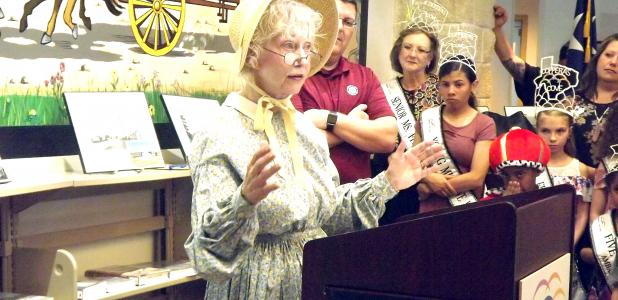Copperas Cove celebrates 140 years
By LYNETTE SOWELL
Cove Leader-Press
The city of Copperas Cove marked 140 years from its humble beginnings at the post office and stagecoach stop at Ogletree Pass on Monday.
Approximately 100 individuals gathered at the Copperas Cove Public Library to hear proclamations along with a brief talk about Cove’s earliest days from longtime resident and local historian, Linda Ledger.
Ledger, clad in the garb of a pioneer woman including a bonnet, said she wanted to speak about a few things others might not know about Copperas Cove’s history.
One of those things was that the central Texas area has been inhabited for 16,000 years. Ledger referenced the Gault site in nearby Florence, where the oldest house foundation in North America was found and its earliest residents hunted mammoths.
She then fast forwarded to 1840, when she said the first non-native Americans started showing up in Central Texas. Among them were families who had been given land to the republic of Texas.
“Men would come to Texas and be awarded a patent, a piece of paper, which entitled them to acreage,” Ledger said. “They would go out and pick a spot and have it surveyed, then redeem it for the patent.”
Among those early settlers were her husband’s family, the Ledgers, which were awarded more than 4,000 acres on what would become Fort Hood. Some of those early pioneers would stay only long enough to fulfill their obligation to the patent, and then sell and move farther west.
Then in 1878, Marsden Ogletree built the stone post office and in 1879, Copperas Cove received its name. Ledger spoke of Jesse Clements, who moved lots and lots of cattle through Copperas Cove.
“It was he who enticed the railroad to come, giving them over 600 acres of land and every other plot of the newly laid out town of Copperas Cove.”
With the railroad’s arrival in 1882, Clements also gave land for the Methodist church and supposedly for the school, but Ledger said she has not seen any records to confirm that.
She told the story of cotton bales lining the railroad tracks, and people being able to jump from one bale to the other for two blocks. At one time, Ledger said, Copperas Cove shipped more cattle than any town between Temple and San Angelo. Then came the 1940s and Camp Hood.
“Camp Hood brought a new place of employment, families who needed housing and shopping, brought shoppers for our stores, and new friends from around the world. So here we are.”
Ledger took the community to task where its history is concerned.
“We still haven’t done a great job of preserving our history. We have no museum. Our Ogletree stage stop is in need of repair. There is no local history room at our local library,” Ledger said. “We don’t have our ancestors’ excuses. Most of us can read and write. Maybe we should take a little interest in our past as we march toward Copperas Cove’s 150th. I offer you this challenge: let’s do a better job of writing about and preserving the past of our fine little city.”
Prior to Ledger’s talk, Mayor Pro Tem Dan Yancey read a proclamation in commemoration of Copperas Cove’s birthday, after which Don Nicholas, the district director local field representative of Congressman Roger Williams, also presented a certificate from Williams in honor of Copperas Cove. Cake and punch were served after the brief ceremony.
Along the wall beneath the Five Hills Art Guild’s newest mural was a lineup of framed photographs of Copperas Cove – then and now. The older photos, taken around 1949, show Copperas Cove’s downtown along with photos of what would become Highway 190, as compared to what they look like today.
Interim city manager Ryan Haverlah offered a few words of welcome for residents.
“This community started in a way that has brought all of us here. There is something valuable here and that’s why all of us are here. This is a valuable place to live and play and learn, and know each other and help each other. Everybody who is here is involved in some way in our community and I want to say think you for what you do for our community and how you improve our community. I anticipate in the future that we will continue to improve, grow, and help each other more and more.”

